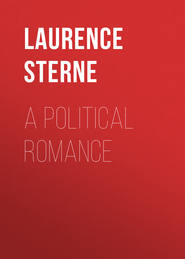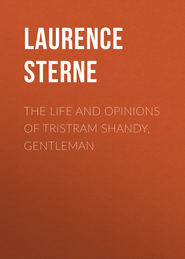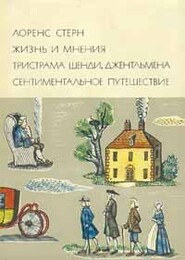По всем вопросам обращайтесь на: info@litportal.ru
(©) 2003-2025.
✖
A Sentimental Journey Through France and Italy
Настройки чтения
Размер шрифта
Высота строк
Поля
In transports of this kind, the heart, in spite of the understanding, will always say too much.
THE LETTER
AMIENS
Fortune had not smiled upon La Fleur; for he had been unsuccessful in his feats of chivalry,—and not one thing had offered to signalise his zeal for my service from the time that he had entered into it, which was almost four-and-twenty hours. The poor soul burn’d with impatience; and the Count de L—’s servant coming with the letter, being the first practicable occasion which offer’d, La Fleur had laid hold of it; and, in order to do honour to his master, had taken him into a back parlour in the auberge, and treated him with a cup or two of the best wine in Picardy; and the Count de L—’s servant, in return, and not to be behindhand in politeness with La Fleur, had taken him back with him to the Count’s hotel. La Fleur’s prevenancy (for there was a passport in his very looks) soon set every servant in the kitchen at ease with him; and as a Frenchman, whatever be his talents, has no sort of prudery in showing them, La Fleur, in less than five minutes, had pulled out his fife, and leading off the dance himself with the first note, set the fille de chambre, the maître d’hôtel, the cook, the scullion, and all the house-hold, dogs and cats, besides an old monkey, a dancing: I suppose there never was a merrier kitchen since the flood.
Madame de L—, in passing from her brother’s apartments to her own, hearing so much jollity below stairs, rung up her fille de chambre to ask about it; and, hearing it was the English gentleman’s servant, who had set the whole house merry with his pipe, she ordered him up.
As the poor fellow could not present himself empty, he had loaded himself in going up stairs with a thousand compliments to Madame de L—, on the part of his master,—added a long apocrypha of inquiries after Madame de L—’s health,—told her, that Monsieur his master was au désespoire for her re-establishment from the fatigues of her journey,—and, to close all, that Monsieur had received the letter which Madame had done him the honour—And he has done me the honour, said Madame de L—, interrupting La Fleur, to send a billet in return.
Madame de L— had said this with such a tone of reliance upon the fact, that La Fleur had not power to disappoint her expectations;—he trembled for my honour,—and possibly might not altogether be unconcerned for his own, as a man capable of being attached to a master who could be wanting en égards vis à vis d’une femme! so that when Madame de L— asked La Fleur if he had brought a letter,—O qu’oui, said La Fleur: so laying down his hat upon the ground, and taking hold of the flap of his right side pocket with his left hand, he began to search for the letter with his right;—then contrariwise.—Diable! then sought every pocket—pocket by pocket, round, not forgetting his fob:—Peste!—then La Fleur emptied them upon the floor,—pulled out a dirty cravat,—a handkerchief,—a comb,—a whip lash,—a nightcap,—then gave a peep into his hat,—Quelle étourderie! He had left the letter upon the table in the auberge;—he would run for it, and be back with it in three minutes.
I had just finished my supper when La Fleur came in to give me an account of his adventure: he told the whole story simply as it was: and only added that if Monsieur had forgot (par hazard) to answer Madame’s letter, the arrangement gave him an opportunity to recover the faux pas;—and if not, that things were only as they were.
Now I was not altogether sure of my étiquette, whether I ought to have wrote or no;—but if I had,—a devil himself could not have been angry: ’twas but the officious zeal of a well meaning creature for my honour; and, however he might have mistook the road,—or embarrassed me in so doing,—his heart was in no fault,—I was under no necessity to write;—and, what weighed more than all,—he did not look as if he had done amiss.
–’Tis all very well, La Fleur, said I.—’Twas sufficient. La Fleur flew out of the room like lightning, and returned with pen, ink, and paper, in his hand; and, coming up to the table, laid them close before me, with such a delight in his countenance, that I could not help taking up the pen.
I began and began again; and, though I had nothing to say, and that nothing might have been expressed in half a dozen lines, I made half a dozen different beginnings, and could no way please myself.
In short, I was in no mood to write.
La Fleur stepp’d out and brought a little water in a glass to dilute my ink,—then fetch’d sand and seal-wax.—It was all one; I wrote, and blotted, and tore off, and burnt, and wrote again.—Le diable l’emporte! said I, half to myself,—I cannot write this self-same letter, throwing the pen down despairingly as I said it.
As soon as I had cast down my pen, La Fleur advanced with the most respectful carriage up to the table, and making a thousand apologies for the liberty he was going to take, told me he had a letter in his pocket wrote by a drummer in his regiment to a corporal’s wife, which he durst say would suit the occasion.
I had a mind to let the poor fellow have his humour.—Then prithee, said I, let me see it.
La Fleur instantly pulled out a little dirty pocket book cramm’d full of small letters and billet-doux in a sad condition, and laying it upon the table, and then untying the string which held them all together, run them over, one by one, till he came to the letter in question,—La voila! said he, clapping his hands: so, unfolding it first, he laid it open before me, and retired three steps from the table whilst I read it.
THE LETTER
Madame,
Je suis pénétré de la douleur la plus vive, et réduit en même temps au désespoir par ce retour imprévù du Caporal qui rend notre entrevûe de ce soir la chose du monde la plus impossible.
Mais vive la joie! et toute la mienne sera de penser à vous.
L’amour n’est rien sans sentiment.
Et le sentiment est encore moins sans amour.
On dit qu’on ne doit jamais se désesperér.
On dit aussi que Monsieur le Caporal monte la garde Mercredi: alors ce cera mon tour.
Chacun à son tour.
En attendant—Vive l’amour! et vive la bagatelle!
Je suis, Madame,
Avec tous les sentimens les plus
respectueux et les plus tendres,
tout à vous,
Jaques Roque.
It was but changing the Corporal into the Count,—and saying nothing about mounting guard on Wednesday,—and the letter was neither right nor wrong:—so, to gratify the poor fellow, who stood trembling for my honour, his own, and the honour of his letter,—I took the cream gently off it, and whipping it up in my own way, I seal’d it up and sent him with it to Madame de L—;—and the next morning we pursued our journey to Paris.
PARIS
When a man can contest the point by dint of equipage, and carry all on floundering before him with half a dozen of lackies and a couple of cooks—’tis very well in such a place as Paris,—he may drive in at which end of a street he will.
A poor prince who is weak in cavalry, and whose whole infantry does not exceed a single man, had best quit the field, and signalize himself in the cabinet, if he can get up into it;—I say up into it—for there is no descending perpendicular amongst ’em with a “Me voici! mes enfans”—here I am—whatever many may think.
I own my first sensations, as soon as I was left solitary and alone in my own chamber in the hotel, were far from being so flattering as I had prefigured them. I walked up gravely to the window in my dusty black coat, and looking through the glass saw all the world in yellow, blue, and green, running at the ring of pleasure.—The old with broken lances, and in helmets which had lost their vizards;—the young in armour bright which shone like gold, beplumed with each gay feather of the east,—all,—all, tilting at it like fascinated knights in tournaments of yore for fame and love.—
Alas, poor Yorick! cried I, what art thou doing here? On the very first onset of all this glittering clatter thou art reduced to an atom;—seek,—seek some winding alley, with a tourniquet at the end of it, where chariot never rolled or flambeau shot its rays;—there thou mayest solace thy soul in converse sweet with some kind grisette of a barber’s wife, and get into such coteries!—
–May I perish! if I do, said I, pulling out the letter which I had to present to Madame de R—.—I’ll wait upon this lady, the very first thing I do. So I called La Fleur to go seek me a barber directly,—and come back and brush my coat.
THE WIG
PARIS
When the barber came, he absolutely refused to have any thing to do with my wig: ’twas either above or below his art: I had nothing to do but to take one ready made of his own recommendation.
–But I fear, friend! said I, this buckle won’t stand.—You may emerge it, replied he, into the ocean, and it will stand.—
What a great scale is every thing upon in this city thought I.—The utmost stretch of an English periwig-maker’s ideas could have gone no further than to have “dipped it into a pail of water.”—What difference! ’tis like Time to Eternity!
I confess I do hate all cold conceptions, as I do the puny ideas which engender them; and am generally so struck with the great works of nature, that for my own part, if I could help it, I never would make a comparison less than a mountain at least. All that can be said against the French sublime, in this instance of it, is this:—That the grandeur is more in the word, and less in the thing. No doubt, the ocean fills the mind with vast ideas; but Paris being so far inland, it was not likely I should run post a hundred miles out of it, to try the experiment;—the Parisian barber meant nothing.—
The pail of water standing beside the great deep, makes, certainly, but a sorry figure in speech;—but, ’twill be said,—it has one advantage—’tis in the next room, and the truth of the buckle may be tried in it, without more ado, in a single moment.
In honest truth, and upon a more candid revision of the matter, The French expression professes more than it performs.
I think I can see the precise and distinguishing marks of national characters more in these nonsensical minutiæ than in the most important matters of state; where great men of all nations talk and stalk so much alike, that I would not give ninepence to choose amongst them.
I was so long in getting from under my barber’s hands, that it was too late to think of going with my letter to Madame R— that night: but when a man is once dressed at all points for going out, his reflections turn to little account; so taking down the name of the Hôtel de Modene, where I lodged, I walked forth without any determination where to go;—I shall consider of that, said I, as I walk along.
THE PULSE
PARIS
Hail, ye small sweet courtesies of life, for smooth do ye make the road of it! like grace and beauty, which beget inclinations to love at first sight: ’tis ye who open this door and let the stranger in.











